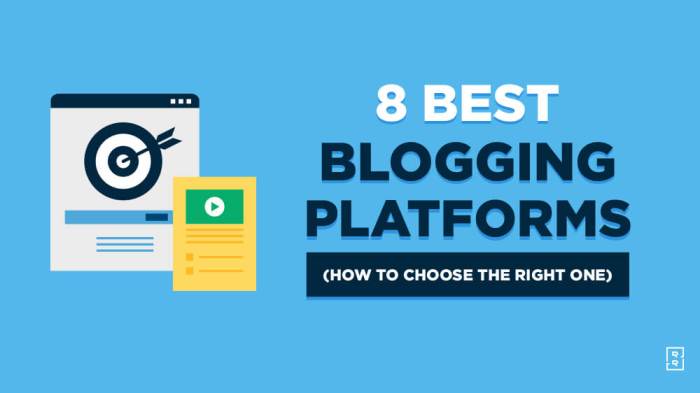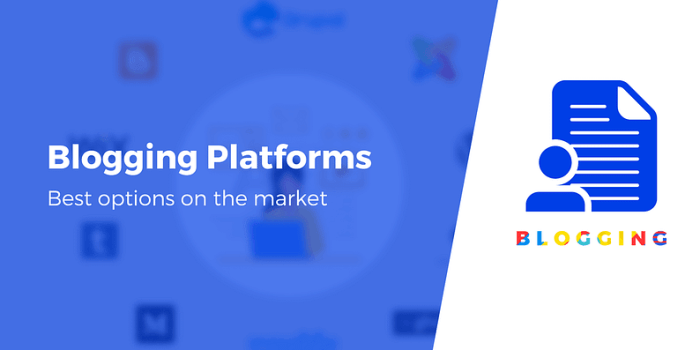Best Blogging Platforms: Looking to start your own blog but not sure where to begin? Dive into our comprehensive guide on the top platforms that can elevate your online presence to new heights.
Overview of Blogging Platforms: Best Blogging Platforms
A blogging platform is a software or service that allows individuals to create and manage a blog on the internet. It provides the necessary tools and features for writing, publishing, and organizing content, as well as customizing the design and layout of the blog.Choosing the right platform for a blog is crucial as it can impact the overall success and functionality of the blog.
The platform determines the ease of use, customization options, capabilities, security features, and scalability of the blog. It also affects the user experience for both the blogger and the audience.
Key Features to Consider in a Blogging Platform Selection
- Customization options: Look for a platform that allows you to personalize the design and layout of your blog to reflect your brand or style.
- tools: Opt for a platform that offers built-in features to help improve your blog’s visibility and ranking on search engines.
- Mobile responsiveness: Choose a platform that ensures your blog looks and functions well on various devices, including smartphones and tablets.
- Security measures: Consider platforms that provide security features such as SSL certificates, regular backups, and spam protection to keep your blog safe.
- Community and support: Select a platform with an active user community and reliable customer support to help you troubleshoot issues and connect with other bloggers.
Popular Blogging Platforms

When it comes to choosing a blogging platform, there are several popular options that cater to different needs and preferences. Here are some of the top blogging platforms available:
WordPress
WordPress is one of the most widely used blogging platforms, known for its flexibility and customization options. It offers a wide range of themes and plugins that allow users to create unique and professional-looking blogs. One of the key features of WordPress is its user-friendly interface, making it easy for beginners to get started with blogging. However, the platform can be complex for those who want more advanced customization options.
Blogger
Blogger, owned by Google, is a free and easy-to-use blogging platform. It is known for its simplicity and integration with other Google services. One of the unique features of Blogger is that it allows users to monetize their blogs through Google AdSense. However, the platform has limited design options compared to other blogging platforms.
Medium
Medium is a popular platform known for its clean and minimalist design. It focuses on the quality of content and has a built-in audience that can help increase the visibility of your blog posts. One of the unique features of Medium is the ability to collaborate with other writers and publications. However, the platform has limited customization options compared to other platforms.In conclusion, each of these popular blogging platforms has its own unique features and advantages.
WordPress is great for customization and flexibility, Blogger is simple and easy to use, and Medium is focused on quality content and collaboration. Depending on your blogging goals and preferences, you can choose the platform that best suits your needs.
Customization and Design Options
When it comes to blogging platforms, the level of customization and design options can vary significantly. Let’s take a look at what different platforms have to offer in terms of making your blog look unique and engaging.
WordPress
WordPress is known for its extensive customization options. Users can choose from thousands of themes, both free and premium, to give their blog a personalized look. Additionally, there are countless plugins available to add functionality and further customize the design.
Wix
Wix is a popular website builder that offers a range of design templates specifically tailored for blogging. Users can easily drag and drop elements to create a visually appealing blog layout. The platform also allows for customization of colors, fonts, and other design elements.
Blogger
Blogger, owned by Google, offers a more straightforward approach to customization. While the options may not be as extensive as WordPress or Wix, users can still choose from various templates and customize the layout, colors, and fonts to some extent.
Squarespace
Squarespace is known for its stunning design templates that are perfect for bloggers looking for a polished and professional look. Users can easily customize these templates by adjusting colors, fonts, and layout options to suit their branding.
Comparison, Best Blogging Platforms
In terms of ease of use for designing and customizing a blog, Wix and Squarespace are often praised for their user-friendly interfaces and intuitive design tools. WordPress, while offering the most customization options, may have a steeper learning curve for beginners. Blogger, on the other hand, provides a more simplistic approach to design customization.
Monetization Opportunities
When it comes to making money through blogging, there are several monetization options available on different platforms. Whether you’re a seasoned blogger or just starting out, understanding how to generate income from your blog is crucial for long-term success.
Affiliate Marketing
Affiliate marketing is a popular way for bloggers to earn money by promoting products or services from other companies. When a reader clicks on an affiliate link on your blog and makes a purchase, you earn a commission. Platforms like WordPress, Blogger, and Wix all support affiliate marketing and provide tools to easily integrate affiliate links into your content.
Display Advertising
Display advertising involves placing ads on your blog, typically through ad networks like Google AdSense. You earn money whenever a visitor clicks on an ad or based on the number of impressions the ad receives. WordPress, Blogger, and Wix all offer support for display advertising, allowing you to monetize your blog through ad placements.
Sponsored Content
Sponsored content is another monetization opportunity where brands pay you to create content featuring their products or services. This can include product reviews, sponsored posts, or brand mentions within your blog posts. Platforms like WordPress, Blogger, and Wix enable bloggers to collaborate with brands and monetize their content through sponsored partnerships.
Membership/Subscriptions
Some blogging platforms offer features for bloggers to create membership or subscription-based content. This allows you to offer exclusive content to paying members or subscribers, generating recurring revenue for your blog. WordPress, Blogger, and Wix provide options for setting up membership areas on your blog and managing subscription payments.
Comparison of Revenue-Sharing Models
WordPress
WordPress allows you to monetize your blog through a variety of methods, including affiliate marketing, display advertising, sponsored content, and memberships. They offer flexibility in choosing how you want to generate income from your blog.
Blogger
Blogger, owned by Google, offers integration with Google AdSense for display advertising. While you can also use affiliate marketing and sponsored content on Blogger, the platform is primarily focused on ad revenue sharing through AdSense.
Wix
Wix provides tools for bloggers to monetize their blogs through display advertising, affiliate marketing, and sponsored content. They offer a user-friendly interface for managing monetization options and generating income from your blog.
Community and Engagement Features

Building a strong community around a blog is crucial for its success. Engaging with your audience and fostering a sense of belonging can lead to increased traffic, loyalty, and overall growth of your platform.
Community-building Tools
- Comment Section: Most blogging platforms offer a comment section where readers can leave feedback, ask questions, and engage in discussions with the blogger and other readers.
- Forums and Groups: Some platforms provide forums or group features where like-minded individuals can connect, share ideas, and build relationships.
- Social Media Integration: Integrating social media sharing buttons allows readers to easily share your content with their followers, expanding your reach and potentially attracting new readers.
Ways to Engage with Your Audience
- Regularly respond to comments and messages to show your audience that you value their input and are actively listening to their feedback.
- Host live Q&A sessions or webinars to interact with your audience in real-time and provide them with valuable insights or information.
- Create polls, surveys, or quizzes to encourage audience participation and gather feedback on their preferences or interests.
Importance of Fostering a Community
Building a community around your blog not only increases reader engagement but also creates a sense of belonging and loyalty among your audience. A strong community can lead to organic growth through word-of-mouth marketing and recommendations.
Mobile Friendliness and Responsiveness
When it comes to blogging platforms, one crucial aspect to consider is how mobile-friendly and responsive they are. With the majority of internet users accessing content on their smartphones and tablets, it’s essential for a blog to be easily accessible and readable on mobile devices.Responsive design plays a significant role in ensuring that a blog adapts to different screen sizes and resolutions, providing a seamless user experience across various devices.
This feature is vital for retaining visitors and keeping them engaged with the content.
Mobile Editing Capabilities
- Tumblr: Tumblr offers a mobile app with robust editing capabilities, allowing users to create and edit posts on the go. The platform’s mobile editor is user-friendly and enables bloggers to format text, add images, and customize their posts easily.
- Squarespace: Squarespace also provides a mobile app for editing content, but the capabilities are more limited compared to Tumblr. Users can make basic edits to their posts, such as updating text and images, but the platform may not offer as many customization options on mobile devices.

